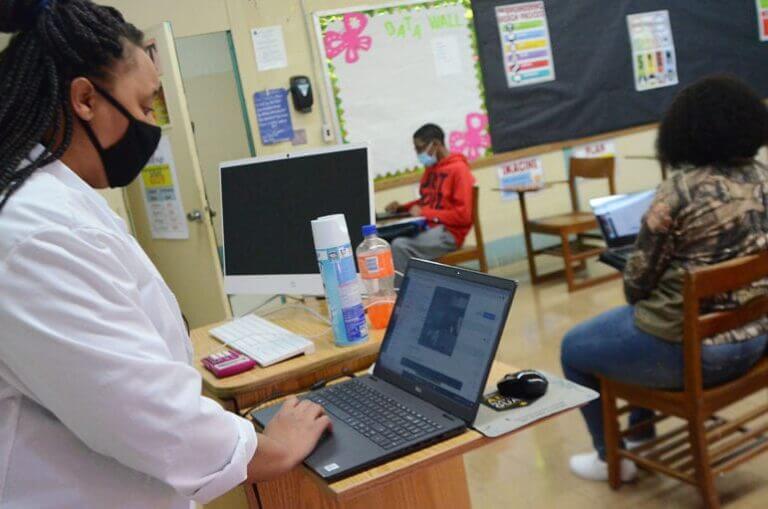

Vickie D. King/Mississippi Today
Biology teacher Chiquita Gaylor and students practice social distancing in the classroom at Jefferson County High School in Fayette.
A first-year teacher in Mississippi will take home an average of $25,500. By their 15th year on the job, that number only rises to around $27,000, according to new data from the Southern Regional Education Board (SREB).
“That’s extremely low, especially if they have a family at that point,” said Megan Boren, a program specialist with SREB, which recently released a dashboard analyzing teacher compensation in 16 southern states. “I think that’s a real struggle point for Mississippi.”
The teacher compensation dashboard, which uses data from the 2018-2019 school year, contains a trove of data looking teachers’ salaries, take-home pay and retirement and health care benefits across the southern region.
Take-home pay is calculated based on several factors depending on the year of the teacher’s employment. A first-year teacher, for example, does not have a health premium deducted to calculate take-home pay whereas a 15th year teacher has the $705 family premium deducted from his or her pay to calculate take-home pay. It also deducts retirement and Medicare contributions as well as federal, state and FICA taxes.
In other words, take home pay is the amount teachers are left with after their paychecks, or gross pay, have been deducted for taxes, benefits and other fees.
It shows that while Mississippi is above the regional average for salaries of teachers with at least 35 years of experience, compensation for young and mid-career educators is low.
And this is on top of the teacher wage penalty, or how much less, percentage-wise, public school teachers are paid in weekly wages relative to similarly educated workers in other fields.
In Mississippi, teachers make about 15.2% less per week than their peers in other job areas in the state. Throughout the southeast, teachers make 20.7% less than other professionals in the region.
“We have to look at teacher compensation as a package,” said Stephen Pruitt, president of the SREB. “It’s great if you’re making ‘x,’ but if you’re only bringing home ‘x’ minus a lot, it’s hard to recruit new teachers into the profession.”
The SREB acts as a bridge between 16 southern states in terms of education policies, practices and research. They are a resource for and work with legislators, governors and education officials in states on issues ranging from teacher preparation to year-round schooling to literacy instruction.
The group hopes states will use the dashboard to make long-term plans to improve teacher compensation in the future.
“We believe strongly we have to elevate the education profession and help people see that it is really the profession that creates all others,” said Pruitt.
In Mississippi, teachers are paid according to a salary schedule based on years of experience and education, and districts often supplement these salaries with their own money. Last year the state Legislature awarded teachers a $1,500 pay raise, so the minimum a teacher can earn on this salary schedule is $35,890 (for a first-year teacher with a bachelor’s degree). The maximum is $68,870, before district supplements.
The 2020-21 salary schedule shows it will take a bachelor’s level teacher a minimum of 27 years to reach a $50,000 salary. For teachers with a master’s degree, that time frame is 20 years and 14 years for teachers with doctoral degrees.
Many teachers, if they choose to stay in education, transition to administration in order to support their families.
Couple the lack of incentives for new teachers and the rising cost of college tuition in Mississippi and the likely result is a major decline in college students completing educator preparation programs. And that is precisely what has happened over the last seven years.
According to a recent report released by Mississippi First, there has been a 32% decline in graduates of educator preparation programs from 2013-2014 to 2017-2018, and the out-of-state pipeline of teachers has diminished almost entirely with a 96% drop in four years.
Erica Jones, president of the Mississippi Association of Educators and a former teacher of 19 years, said she talks to students in teacher preparation programs across the state for her job. She has heard from many of them they plan to take a job in another state after graduating so they can make a higher salary.
“I recall all too well having the low salaries and trying to make ends meet,” she said.
Her husband is also an educator, and he eventually transitioned to an administrator role.
“He was an excellent math teacher, so I hated to see him do that, but in order for us to survive as a family, he had to,” she said.
Shannon Eubanks, an academic coach in Brookhaven and a former teacher and principal, said over his 25-year education career, he has seen and experienced the impact of those numbers.
“The first three years a teacher starts out they get no pay raise from the state of Mississippi … so already, right off the bat, they’re set back,” said Eubanks.
He said he also sees young teachers struggle with costs of child care — a problem exacerbated by the COVID-19 pandemic — and paying off their student loans.
And while many tout the quality of teachers’ health and retirement benefits, recent changes to the pension plan and high premiums for family health insurance remain a problem.
After the recession many states cut benefits by increasing employee contributions and retirement ages. Mississippi, for example, increased the required years of service to retire from 25 to 30 years for teachers hired on or after July 1, 2011.
“Anecdotally, it seems like every time there’s talk of a pay raise, there’s a raise in our family premium,” Eubanks said, noting he and other educators received notice there would be a premium increase for family coverage beginning in January. Because he’s been in the system longer, he’s not as negatively affected — but newer teachers bear the brunt of the increases.
And anywhere from 92 to 94% of teachers will never break even, or earn a pension worth more than their own contributions plus interest, according to the data. The regional average of teachers who won’t break even is 74%.
“Legislators often say teachers have a great retirement package, but for someone who’s just starting off teaching, that’s not going to put food on the table that night,” said Jones.
These are all areas policymakers need to consider, said Boren, the program specialist, as the teacher shortage issue in the state gets worse.
“Mississippi is doing pretty well for teachers who are nearing retirement — their average top salary is above the regional salary, but they’re pretty low in compensating new beginning teachers and teachers in that mid-career piece so that’s one thing policymakers could think about … to increase recruitment and retention,” said Boren. “That really does need to be coupled with a plan for increased support for teachers. Teachers are leaving more so because they don’t feel supported instructionally by their colleagues and their leaders, and increasing that quality support whether through mentorship, better professional development, better school culture, all of those things.”
The post Pay for new, mid-career teachers in Mississippi ‘extremely low’ compared to other Southern states appeared first on Mississippi Today.
- Scott Colom raised most money, but Cindy Hyde-Smith has most cash before March primary - February 21, 2026
- Patients face canceled surgeries and delayed care amid UMMC cyberattack - February 20, 2026
- Goal is ‘better alignment, not bigger government’ for Mississippi tourism - February 20, 2026